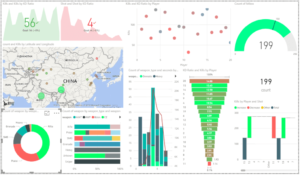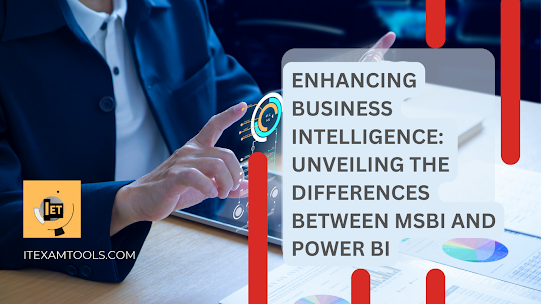Enhancing Business Intelligence: Unveiling the Differences between MSBI and Power BI
Enhancing Business Intelligence: Unveiling the Differences between MSBI and Power BI
Following are the criteria on which the comparison shall take place for MSBI vs Power BI:
- Definition
- License
- Implementation
- Benefits
- Learning Aspect
- User Experience
- Data
Definition
SSRS or SQL Server Reporting Service is a BI Service for data analysis and generating reports on Server Based Data. It was developed in 2004 by Microsoft, along with its Data Analytics(SSAS/SQL Server Analysis Service) and Data Integrating(SSIS/SQL Server Integration Service) counterparts.
It is a comprehensive extensible reporting platform and includes an integrated set of processing components and programmatic interfaces. It is used to design test and deploy the report.
Power BI, which is also developed by Microsoft in the year 2017, is a data analysis tool, which can be used for reporting and data analysis from a wide range of data sources. Power BI desktop allows its users to create and publish reports on the fly, which the end-users can view using any browser.
It is simple and user-friendly, which helps business analyst skills and empowers users to work easily on it. It is very useful for the analysis of complex and huge data sets. It is widely used for modeling and structuring unshaped data.
If you’re wondering what does it actually take to become a BI Developer? Well, you can check out the Power BI Course Details curated by Industry Experts before going ahead with the blog. Power BI Course will help you master the concepts such as Power BI Desktop, Mobile Apps, Reports, Architecture, DAX, Service, and many more.
This Edureka Tutorial on “Power BI vs MSBI” provides you with a short and crisp description of two highly popular BI Tools used in the industry i.e. MSBI and Power BI.
The biggest difference between these two systems is the way in which they are deployed.
Power BI is a cloud-based software and is hosted on the vendor’s servers and accessed through a web browser, whereas, MSBI is an on-premise software is installed locally, on a company’s own computers and servers. The fact that both of these services are equally promising, has led to an ongoing discussion about the superiority and the security concerns of one over the other.
 The fundamental point is that not all solutions work equally well on the Cloud or in an on-premise hosted solution. There are benefits and disadvantages to both platforms. Your choice between these platforms will depend a lot on the type of need, service, or software you’re considering.
The fundamental point is that not all solutions work equally well on the Cloud or in an on-premise hosted solution. There are benefits and disadvantages to both platforms. Your choice between these platforms will depend a lot on the type of need, service, or software you’re considering.
In the case of Power BI, hardware failures do not result in data loss because of networked backups. Cloud computing uses remote resources, saving organizations the cost of servers and other equipment. A utility pay structure in Power BI enables users to only pay for the resources they use.
However, with the rise of cloud-based services, fear comes into play. After all, you are trusting someone else to host your data, aren’t you? This fear is so widespread that many IT leaders believe that these powerful cloud services are a security nightmare.
Find out our Power BI Training Course in Top Cities
Benefits: MSBI vs Power BI
 Both of these services have their own benefits. While SSRS by MSBI has a better drill-down capacity Power BI, on the other side, has a plethora of rich visuals which represent data so much better.
Both of these services have their own benefits. While SSRS by MSBI has a better drill-down capacity Power BI, on the other side, has a plethora of rich visuals which represent data so much better.
This basically means, in MSBI, information to detailed data which is categorized by/focused in on a certain factor, is reached for effectively. But Power BI is a better Analytics tool due to its Data modeling capabilities and a strong visual representation of data. Also, since, it was designed to improve the Self-Service capabilities of older SSRS, anybody who can visualize data can use it easily.
License
The free version of MSBI lasts for 180 days followed by charges = $931.
Power BI’s free version lasts for 60 days followed by charges = $9.99.
BI and Visualization Training
NOTE: The pricing I’ve mentioned here is only the base price and there are other versions of these services and the prices vary for each of them.
Learning Aspect

Power BI is a graphical tool. So, through drag and drop, you can fulfill most of your requirements. But its background processes are hidden and you can’t understand how it processes internally.
In SSRS, the developer has to do all the coding and designing of the report, therefore, the developer has a better picture of the process.
User Experience
Power BI has more of a graphical component as compared to SSRS. This makes the former way more efficient and easier to use, making SSRS the more manual and difficult option for analysis and generating the reports.
Data

Power BI can deal with structured as well as unstructured data but its data capacity is limited to 10 MB or 33,000 rows of data.
SSRS deals with structured and semi-structured data and doesn’t put that much stress on the data engine, hence, you can create larger reports on it.
Conclusion: MSBI vs Power BI
SSRS is for your pixel-perfect, operational reporting. Power BI is first and foremost an analysis tool, it allows you to visualize your data in different ways in order to allow a deeper understanding of your business.
Till now SSRS has a lot of presence but now Power BI has made its presence known across all domains. The choice between Power BI and SSRS would most likely be straightforward and driven by requirements. If your organization only uses paginated reports on-premises, you will decide that SSRS is a more cost-effective option. On the other side if you have the need to render interactive or analytical reports on-premises, or you already have SQL Server Enterprise Edition with Software Assurance, then Power BI Reporting Services will likely be your preferred choice. Don’t miss out on this opportunity to enhance your career prospects and become a sought-after business intelligence professional. Click the link below to enroll in our MSBI Course now!
So, now that you know the pros and cons of each of these services, which one do you prefer? If you like this article and want more such content on Business Intelligence, do tell us in the comment section below, and we shall be happy to oblige. If you wish to build a career in business intelligence, our Business Intelligence Course will help you mine that data and enhance the decision-making processes throughout your organization.
Aslo, Transform data into insights and advance your career with our comprehensive Business Analyst Course.
Got a question for us? Please mention it in the comments section and we will get back to you.
LEARN MORE
https://analyticstwitter.blogspot.com/2023/07/the-top-21-data-engineering-interview.html
https://analyticstwitter.blogspot.com/2023/07/the-top-10-data-analytics-careers.html
https://analyticstwitter.blogspot.com/2023/07/5-types-of-binary-tree-explained.html
https://analyticstwitter.blogspot.com/2023/06/what-is-sarimax-model.html
https://analyticstwitter.blogspot.com/2023/06/how-to-build-predictive-model-in-python.html
https://analyticstwitter.blogspot.com/2023/06/top-10-data-analytics-tools-you-need-to.html
https://smartlifegadgets.shop/portable-safety-door-lock/
https://smartlifegadgets.shop/4-in-1-multifunctional-laser-measuring-device/
https://smartlifegadgets.shop/avianto-360-waterproof-quartz-watch/
https://smartlifegadgets.shop/self-wringing-mop/
https://smartlifegadgets.shop/crevice-cleaning-brushes/
https://itexamtools.com/top-100-react-hooks-courses-and-qa/
https://itexamtools.com/top-100-socket-io-courses-and-qa/
https://itexamtools.com/top-100-redux-framework-courses-and-qa/
https://itexamtools.com/top-100-front-end-web-development-courses/
https://itexamtools.com/top-100-graphql-courses-and-qa/



Comments
Post a Comment